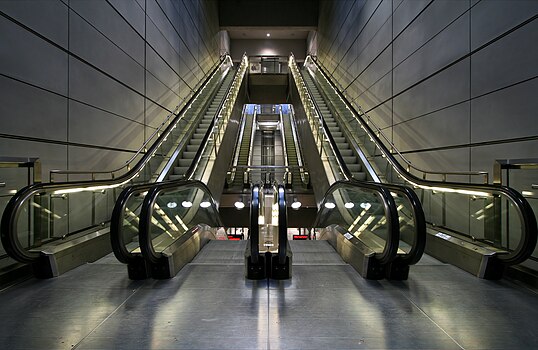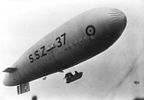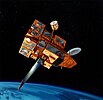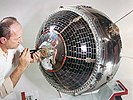Portal:Technology
The Technology Portal
Technology is the application of conceptual knowledge to achieve practical goals, especially in a reproducible way. The word technology can also mean the products resulting from such efforts, including both tangible tools such as utensils or machines, and intangible ones such as software. Technology plays a critical role in science, engineering, and everyday life.
Technological advancements have led to significant changes in society. The earliest known technology is the stone tool, used during prehistoric times, followed by the control of fire, which contributed to the growth of the human brain and the development of language during the Ice Age. The invention of the wheel in the Bronze Age allowed greater travel and the creation of more complex machines. More recent technological inventions, including the printing press, telephone, and the Internet, have lowered barriers to communication and ushered in the knowledge economy.
While technology contributes to economic development and improves human prosperity, it can also have negative impacts like pollution and resource depletion, and can cause social harms like technological unemployment resulting from automation. As a result, philosophical and political debates about the role and use of technology, the ethics of technology, and ways to mitigate its downsides are ongoing. (Full article...)
| More about Technology... |
Selected article
Selected picture
Selected biography
At the beginning of the Apollo program, Kraft retired as a flight director in order to concentrate on management and mission planning. In 1972, he became director of the Manned Spacecraft Center (later Johnson Space Center), following in the footsteps of his mentor Robert Gilruth. He held the position until his retirement from NASA in 1982. During his retirement, Kraft has consulted for numerous companies including IBM and Rockwell International, and he published an autobiography entitled Flight: My Life in Mission Control.
Did you know...
Instructions
These "Did you know..." subpages are randomly displayed using {{Random portal component}}.
- The layout design for these subpages is at Portal:Technology/DYK/Layout.
- DYKs at this list must have successfully already appeared at Template:Did you know.
- Add a new DYK to the next available subpage.
- Update the max value at the portal main page. (Only include completed sets of 3.)
DYK list
- ... that DNA digital data storage has been called "apocalypse-proof" by one of its creators due to its longevity under certain conditions and its resistance to obsolescence?
- ... that rayon fibers used to make clothes come from trees pulped using the sulfite process?
- ... that the first SS class blimp (pictured) entered service on 18 March 1915, fewer than three weeks after work began on it?
- ... that hurdle technology is a technique where pathogens in a food product are subjected to "hurdles" designed to inhibit or kill them?
- ... that the Tatara Bridge (pictured) in Japan has the longest span of any cable-stayed bridge in the world?
- ... that Singapore's 5.4-ton Pegasus is the first helicopter-portable 155mm howitzer with a self-propelled capability?
- ... that the ADEOS II satellite (pictured), which cost 70 billion yen (US$570 million) to develop, failed 10 months into the mission after the solar panel malfunctioned?
- ... that the British breastwork monitors designed by Sir Edward Reed were the direct ancestors of the pre-dreadnought battleship and the dreadnought?
- ... that Trawscoed fort was explored using fluxgate gradiometer surveys?
- ... that the chemical element einsteinium was discovered in the debris of the Ivy Mike nuclear test in 1952?
- ... that an animation database stores fragments of animations or human movements and can be used to re-assemble new animations?
- ... that from 1980 to 2005, the Ust-Ilimsk Hydroelectric Power Station (pictured) in Russia generated over 600 billion kWh of electricity?
- ... that only one of the 266 1076 Class steam locomotives built for the Great Western Railway was named, and the rest had only numbers?
- ... that one of the humanoid robots created by Japanese roboticist Tomotaka Takahashi was listed in Time’s Coolest Inventions in 2004?
- ... that the Barbarigo (pictured) was a World War II Italian submarine that mysteriously disappeared in 1943?
- ... that the electric flash-lamp, a photographer's light source, was used as an underwater mine detonator fuse?
- ... that American aircraft designer Clyde Vernon Cessna's most famous inventions included the cantilever wing and the V-shaped tail configuration?
- ... that Linimo (pictured) in Aichi, Japan, claims to be the world's first commercial automated "Urban Maglev" train, but it has to be shut down when it is too windy?
- ... that inventor Thomas Highs was never credited for his invention of both the spinning jenny (pictured) and the water frame, mostly due to his lack of funding to patent the devices?
- ... that the six Charles Tayleur locomotives ordered by Isambard Kingdom Brunel for the Great Western Railway were unsuccessful?
- ... that the Goose Creek Oil Field in Galveston Bay had the first offshore oil wells in Texas, U.S., and the removal of oil led to subsidence of the overlying terrain?
- ... that F.I.B.S. is the earliest backgammon server on the internet and has been actively operating since July 19, 1992?
- ... that Nicholas Christofilos designed the Astron fusion power machine while selling elevators?
- ... that between 1930 and 1933, the Russian battleship Parizhskaya Kommuna (pictured) carried a Heinkel aircraft catapult?
- ... that the Z machine, operated by Sandia National Laboratories, is the most powerful x-ray generator in the world?
- ... that the Open NAND Flash Interface Working Group is developing a standardized interface for NAND flash, the memory used in flash drives, digital cameras, and MP3 players?
- ... that the Explorer 32 (pictured) satellite was able to determine the density of the upper atmosphere through ground-based observations of the effect of drag on the satellite?
- ... that electrothermal-chemical technology can now almost double the muzzle energy of a tank gun?
- ... that the Narita Shinkansen from Tokyo to Narita International Airport, which took nine years to build 9 km of track bed, is the only bullet train line ever officially cancelled?
- ... that Malin Space Science Systems operates the camera on the Mars Global Surveyor (pictured)?
- ... that Tingmissartoq, Charles and Anne Morrow Lindbergh's Lockheed Sirius, was so christened by an Eskimo boy in Greenland, and that its name means "one who flies like a big bird"?
- ... that an electronic gear-shifting system for bicycles can shift faster than a traditional mechanical system and calibrate itself to minimize maintenance?
- ... that in 1966, Heinz Waaske created the smallest 135 film camera made to that date, the Rollei 35 (pictured)?
- ... that Charles Stross's science-fiction novel Singularity Sky inspired a proposal to undermine the Taliban by giving every Afghan a free mobile phone?
- ... that from 1955 to 1973, the United States conducted a scientific initiative aimed at producing gravity-manipulation technology?
- ... that Salmson 2 (pictured), along with the Breguet 14, was the main reconnaissance aircraft of the French army in World War One?
- ... that Robert V. Decareau was known as "Mr. Microwave" for his research on microwaves in food that led to the development of the microwave oven?
- ... that toilets in Japan (pictured) are among most technologically advanced toilets in the world today?
- ... that no electricity has been generated by the barge-mounted electric power generating station that was delivered to Ghana in 2002?
- ... that in 2010, three of the four largest power stations in the world were in South America?
- ... that a Rans S-6 Coyote II (pictured), a type of homebuilt aircraft, has flown across the Atlantic Ocean twice?
- ... that Stephen Fry asked on Twitter for suggestions to name a BBC television series on the impact of the Internet, now called The Virtual Revolution?
- ... that the Chemical Automatics Design Bureau produced the Soviet Union's only operational nuclear rocket engine?
- ... that the Persian king Cyrus the Younger invented the scythed chariot (pictured)?
- ... that Mercedes Reaves, a Puerto Rican research engineer and scientist, is responsible for the design of a viable, full-scale solar sail at the NASA Langley Research Center?
- ...that the village of Denshaw in Greater Manchester (pictured) achieved international notoriety when spoof information added to its Wikipedia entry was reported in national and international media?
- ...that Susan Hadden, an Internet affairs advisor to Al Gore, was killed by bandits while visiting Angkor Wat?
- ...that "On the Internet, nobody knows you're a dog" is the most reproduced cartoon from The New Yorker magazine, and its title a phrase still used around the world?
- ...that the Poker players alliance hired former Sen. Alfonse D'Amato (pictured) to help overturn Unlawful Internet Gambling Enforcement Act that makes it illegal for financial institutes to deal with online gambling sites?
- ...that poet, film producer and journalist Pritish Nandy is credited with opening India's first Internet cafe in 1996?
- ...that Vishvakannada.com was the first Internet magazine in Kannada and also the first website in an Indian language to use dynamic fonts?
- ...that Senator Ron May is credited with installing the first wireless internet network in the Colorado State Capitol (Capitol pictured)?
- ... that in 2009, the video sharing website Trilulilu was one of the most visited websites in Romania, with an average of 2.2 million unique visitors per month?
- ...that the All Sky Automated Survey is a Polish astronomical project based in Chile, controlled remotely from Poland through the Internet, and that it has discovered two comets since 1996 with a tiny budget?
- ...that the docu-drama The Road to Guantanamo, depicting the incarceration of three British detainees at Guantanamo Bay, is the first film to be released simultaneously in theatres, on DVD and on the Internet?
- ...that the Association of Pizza Delivery Drivers is a union that represents pizza-delivery drivers, and is one of the first unions in the United States to operate entirely over the Internet?
- ...that F.I.B.S is the earliest backgammon server on the internet and has been actively operating since July 19, 1992?
- ...that through the rec.arts.sf.tv.babylon5.moderated Usenet newsgroup, Babylon 5 creator and writer J. Michael Straczynski (pictured) is often credited as being the first TV producer to directly engage with his fans on the internet, and have their comments impact the look and feel of his work?
- ...that the Working Group on Internet Governance is a United Nations body set up to investigate the future governance of the Internet and the role of ICANN?
- ...that the Indian Railways Fan Club is the Internet's largest website devoted to the Indian Railways and rail transport in the Indian subcontinent?
- ...that cyber law author and professor Jonathan Zittrain co-founded StopBadware.org to distribute the task of collecting data about malware to Internet users at large?
- ...that Egg Banking plc is now the world's largest "pure" internet bank, meaning it's only accessible from the internet?
- ... that anarchist Internet archive Spunk Library was once falsely accused of collaborating with the terrorist guerrilla outfit Red Army Faction?
- ... that Japan's entomological warfare program in China during World War II used plague-infected fleas and cholera-coated flies (cholera pictured) to kill nearly 500,000 people?
- ... that vaporized hydrogen peroxide was used to disinfect buildings contaminated in the 2001 anthrax attacks in the U.S.?
- ...that James Jurin used statistical studies to show the probability of death from smallpox vaccine was significantly less than from smallpox?
- ... that the Spanish–American War-era Fort Terry on Plum Island (pictured) was used as a U.S. biological weapons research facility from 1952 to 1969?
- ...that Dr. Acacio Gabriel Viegas was credited with the discovery of the outbreak of bubonic plague in Mumbai in 1896, & later became the president of the Bombay Municipal Corporation?
- ... that from 1962 to 1973, the Deseret Test Center in Fort Douglas, Utah, oversaw 46 tests using simulants and live biological and chemical agents?
- ... that the U.S. E61 anthrax bomblet was perceived as superior to another, earlier anthrax weapon, the M114 bomb (pictured)?
- ...that the color signals of Israel Broadcasting Authority television transmissions were erased until 1981, to insure equality for families who couldn't afford color-tv?
- ...that the Zambian district of Chiengi has no television or telephone service?
- ... that in 1912 Taraknath Palit donated money and property worth ₹15 lakh (US$18,000) to Calcutta University for the establishment of University College of Science and Technology (pictured)?
- ...that a Jerusalem orphanage is one of Israel's most important technological training centers?
- ...that internet penetration in Bangladesh grew in three years from 3.2 percent of the population to 21.27 percent in 2012?
- ... that while serving as the first Chair of the School of Aeronautics at the Georgia Institute of Technology (pictured), Montgomery Knight developed one of the first jet-powered helicopter rotors?
- ... that the BIL gates technology recently entered into the public domain?
- ... that the National Polytechnical Museum in Sofia holds the only Bulgarian-manufactured Hammond organ?
- ... that the ten-lined urchin (pictured) was one of several species used in research to determine the feasibility of using non-invasive MRI technology to study the internal anatomy of echinoids?
- ... that Shu-Park Chan, the founder of International Technological University in Silicon Valley, had earlier tried to start a university in China?
- ... that Tultepec, Mexico, the host of the country's National Pyrotechnic Festival, produces around half of the nation's fireworks with sixty percent of the town's population involved in the business?
- ... that IBM physicist Leroy L. Chang, honoured for his work on superlattice heterostructures, moved to HKUST university (pictured) in 1993 owing to Hong Kong's impending 1997 transfer to Chinese control?
- ... that the Hope City technology park being built in Ghana is expected to include Africa's tallest building?
- ... that Carlos López Estrada won a Latin Grammy Award for directing a music video that employs stop motion technique?
- ... that ITM Power are developing technology to make the Isle of Wight (pictured) carbon neutral?
- ... that an electrical engineer and interim president of Georgia Tech, Henry C. Bourne, Jr., funded an academic chair in poetry?
- ... that over fifty organizations helped director Stanley Kubrick to imagine the technologies in 2001: A Space Odyssey?
- ... that scientists at the Fraunhofer Institute for Chemical Technology (pictured) won the 2010 European Inventor Award for their work on the development of liquid wood?
- ... that 2012 Australian Paralympic athletics competitor Simon Patmore has Erb's palsy and works as a technology officer?
- ... that DARPA director Arati Prabhakar was the first female director of National Institute of Standards and Technology, and also the first woman to earn a Ph.D. in applied physics from Caltech?
Nominations
- Any Technology-related WP:DYKs that have previously appeared at Template:DYK may be added to the next available subpage, above.
- All hooks must first have appeared on the Main Page in the Did you know section.
- Note: -- Each hook and selected fact requires a link cited at its respective subpage to the time it appeared on the Main Page in Template:Did you know, or the associated WP:DYK archive at Wikipedia:Recent additions.
Related portals
Categories
Things you can do

|
|
Associated Wikimedia
The following Wikimedia Foundation sister projects provide more on this subject:
-
Commons
Free media repository -
Wikibooks
Free textbooks and manuals -
Wikidata
Free knowledge base -
Wikinews
Free-content news -
Wikiquote
Collection of quotations -
Wikisource
Free-content library -
Wikispecies
Directory of species -
Wikiversity
Free learning tools -
Wikivoyage
Free travel guide -
Wiktionary
Dictionary and thesaurus











































